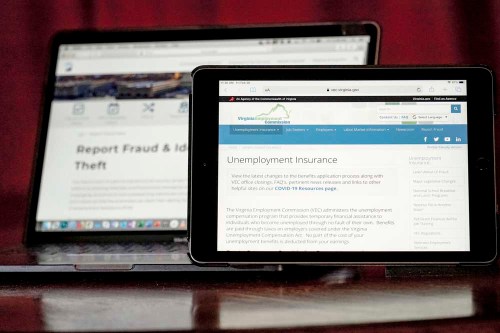Oregon man who defrauded COVID-19 relief programs gets 4 years in prison
Published 7:00 am Monday, January 10, 2022

- Web pages used to show information for collecting unemployment insurance in Virginia, right, and reporting fraud and identity theft in Pennsylvania, are displayed on the respective state web pages, on Feb. 26.
PORTLAND — An Oregon man who created several hundred employees out of thin air and then fraudulently obtained $3.4 million in COVID-19 relief funds has been sentenced to four years in prison.
Andrew Aaron Lloyd invested his ill-gotten gains and won big — eventually purchasing more than 15,000 shares of Tesla stock and 25 rental properties in Oregon and California, valued at a combined $18 million.
Trending
Lloyd, a 51-year-old Lebanon resident, has been ordered to pay $4 million in restitution, give up the real estate assets and forfeit his stock in the electric car manufacturer.
His sentencing marks Oregon’s largest closed case of COVID-19 relief fraud, according to a U.S. Attorney’s Office spokesperson. West Linn dentist Salwan W. Adjaj was charged with bilking nearly $8 million in December, per court records, and remains in custody on a pretrial release violation.
In a sentencing memo calling for a harsher 65-month sentence, federal prosecutors called Lloyd an “opportunistic fraudster” who got lucky as a day trader.
“The seriousness of the offense is not diminished by sheer dumb luck,” Assistant U.S. Attorney Gavin W. Bruce wrote. “Lloyd did not return these funds voluntarily; law enforcement recovered the funds before he could spend them or lose them.”
Court records show Lloyd transferred a $1.8 million slice of his Paycheck Protection Program funds to a brokerage account, which grew to $13 million as Tesla stock soared. Lloyd also obtained a fraudulent $160,000 Economic Injury Disaster loan from the U.S. Small Business Administration.
Over 60 days, Lloyd submitted more than a dozen phony applications for home care, shopping and construction businesses, often duplicating the same list of 56 “fictitious” employees while claiming millions of dollars in phony payroll expenses, court documents say.
Trending
He closely tracked the various rounds of Paycheck Protection Program funding, at one point assuring an accomplice that the ruse would work because Congress would add “another [$]300 billion very soon,” the documents say.
Lloyd was indicted last January and pleaded guilty in June to charges of bank fraud, money laundering and wire fraud. He was sentenced this week.
His accomplice, Russell Anthony Schort, submitted another fake application crafted by Lloyd in exchange for a $295,000 cut of the proceeds, according to prosecutors.
But Schort, 39, of Myrtle Creek, was “not the mastermind” of the plot, prosecutors said. He served 14 days in prison and was sentenced in November to time served, as well as restitution of the cash and three years of probation. Schort and Lloyd are among the 10 total people who have faced federal charges for perpetrating or participating in COVID-19-relief fraud schemes, according to the U.S. Attorney’s Office spokesperson.
The Paycheck Protection Program — which allowed businesses to obtain forgivable loans in exchange for keeping workers employed early in the pandemic — provided 51,000 loans in Oregon, totaling more than $3 billion, according to the Small Business Administration. The program ran out of funds in May.
“PPP funds were not unlimited, and misdirecting emergency assistance from small businesses who need it to stay afloat harmed innumerable businesses and workers,” prosecutors said.









